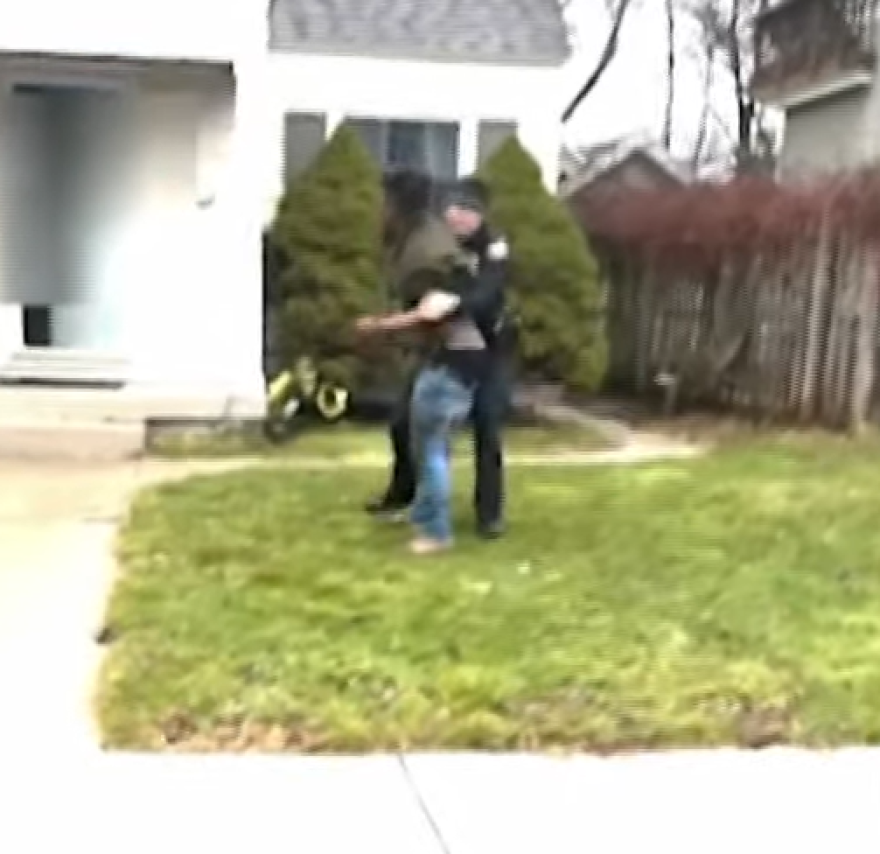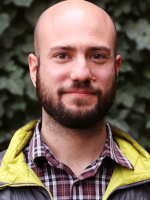Updated April 12, 2022 at 4:15 p.m.
The Grand Rapids Police Department Wednesday provided video evidence showing four different angles of the fatal shooting of 26-year-old Patrick Lyoya by a police officer nine days ago.

One of the sources, the officer’s body camera, was shut off shortly before the fatal shooting, an act that requires pressure on a button for at least three seconds. A third-party cell phone video was the only source that captured the full situation. A vehicle dash cam and a neighbor’s security camera provided additional views.
The cell phone footage shows a struggle between between Lyoya and the officer over the officer's stun gun. It shows the police officer, who has not been named, kneeling on the back of Lyoya and shouting “Let go of the Taser” multiple times before fatally shooting him. Grand Rapids Police Chief Eric Winstrom said the shot appeared to have hit Lyoya in the back of the head.
You can watch the full press conference, which contains footage from all four videos, here. WARNING: These videos contain graphic images that may be disturbing and difficult to watch.
Lyoya was pulled over due to improper registration of the vehicle he was driving, Winstrom said. Lyoya exited his vehicle after being pulled over, and eventually ran on foot before being tackled by the officer.

Winstrom said he released the videos in the spirit of transparency.
State police are investigating the shooting.
Lyoya was 26 years old, a child of refugees who came to Michigan from the Democratic Republic of the Congo.
Winstrom said the officer is on paid leave, and has been "stripped of his police powers" pending the results of the investigation.
Michigan Radio's Dustin Dwyer spoke with Stateside's April Baer on Wednesday, April 13, 2022. You can hear that full conversation in the audio player at the top of this post.
Original post, April 13, 2022 at 6:48 a.m.: "We told you so": Activists speak out as city of Grand Rapids prepares to release video of police shooting
“We told you so.”
On Tuesday, hundreds of people marched through the streets of Grand Rapids demanding justice for Patrick Lyoya, a 26-year-old man killed by a Grand Rapids police officer last week. Following the march, many of the protesters lined up inside city hall to comment at the regularly scheduled city commission meeting.

And many of the activists echoed the same message:
“We told you so,” said one activist who identified herself only by her first name, Aly.
“We have told you exactly what was going to happen, and you didn’t believe us. You should all be ashamed.”
Aly, who leads the Royal Black Panther Party Grand Rapids, asked that her last name not be used, because of fears of threats.
She’s one of a number of people who spoke at city commission meetings over the past year, who said they believed the practices at GRPD would lead to death.
Tuesday, they blamed commissioners for failing to adequately rein in the department.
“We activists have been trying to tell you that G-R is no different from Ferguson, Minneapolis, Detroit or Chicago,” said Nikita Miner. “Police have too much power, and it’s extrajudicial and it’s illegitimate."
“There is no justice for Patrick Lyoya, because justice would be if he was still here.”Danah Montgomery, resident and activist in Grand Rapids
“Why does it take people having to get killed for you to really have to do something? Y’all should have been [doing] something,” said DeAndre Jones, a resident who regularly talks about police issues at city commission meetings. “That’s inexcusable.”
“There is no justice for Patrick Lyoya, because justice would be if he was still here,” said Danah Montgomery. “You let that man die. His blood is on your hands.”
Lyoya was 26 years old, a child of refugees who came to Michigan from the Democratic Republic of the Congo. His parents speak only in Swahili, and have been sharing their story with local media with the help of a translator.
On Friday, Lyoya's father appeared on the Pulse of the City, a local radio show hosted by Robert S. Womack, who also serves on the Kent County Board of Commissioners.
During the interview, Lyoya’s father broke down while trying to describe what he says he saw when police first showed him the video of the shooting.
“Patrick was on the floor,” said the family’s translator Israel Siku, who says he also saw the video. “And the police was on him, his knee was on his back, and without hesitation, he pulled the gun and he shoot him in the back of the head.”
In a statement, the city said the shooting happened after Lyoya was pulled over and tried to run away from the police officer. The officer chased him, according to the city, and fired his weapon after a struggle.
A study released by the city in 2017 found that Black drivers were twice as likely to be pulled over by Grand Rapids police as white drivers. The study was part of an effort to reduce bias in the department and improve outcomes, one of many such efforts over the years. In its most recent effort, GRPD announced a new strategic plan in 2020, with more focus on community-based policing, and bias training for officers. The city also created an online dashboard showing metrics to track the plan’s implementation.
Despite those efforts, community members told commissioners the city hasn’t gone far enough to fix the department.
“There’s been various groups that have come before this very commission — many of you guys weren’t here — that have asked for reform in different ways,” said Eric Brown, president of the Urban League of West Michigan. “Big days are ahead of you guys.”
"I think we are in a place right now that I would describe as the darkest day in our city’s history.”Grand Rapids city commissioner Senita Lenear
After more than three hours of comments from the public, city commissioners shared their thoughts on the situation, striking a somber tone as many seem to worry that the video evidence planned to be released later on Wednesday will create even more anger and trauma for the community.
“My heart is heavy,” said commissioner Senita Lenear. “I think we are in a place right now that I would describe as the darkest day in our city’s history.”
Lenear said she was motivated to first run for commissioner in an effort to help prevent, “this very thing from happening.”
“I want you all to know, I’ve been trying,” Lenear said.
Another commissioner, Nathaniel Moody, apologized to the activists for chastising them during meetings last year when they warned about GRPD’s tactics.
“I dropped the ball. I was elected to listen and to hear you and I ended up scolding you, and I’m sorry for that,” Moody said. “I ask that you would give us, and me, another chance, and let us do this thing right.”
“This has been horrific,” said city attorney Anita Hitchcock. “Just as you hold us accountable, it’s our intent to hold people accountable.”
The Michigan State Police continues to investigate the shooting and charges against the officer haven’t been ruled out.
The city says it will release multiple videos showing Patrick Lyoya’s killing at 3 p.m. Wednesday.










